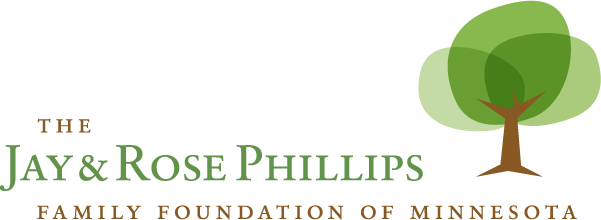As a parent, and the product of a pretty traditional education experience, I tend to think of schools as something I support, that I give to. Whether as a volunteer, a donor, a taxpayer or an advocate, my job as an adult is to help schools do a good job of educating kids – mine and others’. I don’t expect schools to support me, to give back to me, or to help my neighbors. But maybe I’ve got this all wrong. A recent event organized by the Foundation to kick-off the 2019-2020 school year for our education grantees has me thinking about how schools could be reimagined as sources of support, rather than recipients of support, and wondering if this mental flip might actually be a critical part of engaging underestimated students in their school experience.
At the end of August, we gathered about 75 educators from Patrick Henry High School, Olson Middle School, and PYC Arts and Tech High School for a day of professional development. The

Kenzie O’Keefe discusses student journalism opportunities at North News
centerpiece of our time together was an Ed Café session facilitated by leaders from Future Focused Education (FFE). FFE operates a network of alternative high schools in Albuquerque, New Mexico. These schools offer students who are disconnected from traditional education a chance to earn their high school diploma, while learning career-relevant skills and completing projects with local employers. FFE envisions its students to be problem-solvers in their communities, and each of its schools brings community partners (employers, government, nonprofits, etc.) together with students to identify meaningful, challenging projects they can accomplish together.
Eleven prospective partners joined us for our Northside Ed Café in August. They ranged from a small neighborhood association to Hennepin County. Each pitched a project that they thought would benefit from student involvement. Here are a few examples:
- A neighborhood association wants help redesigning a program that matches local youth with seniors who need help with chores.
- A housing organization seeks help developing a renter’s rights campaign to alert Northside families to the predatory practices of exploitative landlords.
- Hennepin County would like students to help with a bridge construction project near North Memorial Hospital. They will have the opportunity to conduct community outreach, advise on aesthetic components and select art.
- Achieve Minneapolis came with a request for help conducting a market research analysis to understand how Achieve’s Step-Up program fits into the landscape of youth employment options.
After the pitches were delivered, educators worked in small groups with the community partners to connect their projects to academic standards, brainstorm logistics such as transportation and tech needs, and identify next steps to get a partnership off the ground. Since August, each school has followed up with one or more of the project partners to continue work implementing these opportunities in the 2019-2020 academic year.
Here are a few comments from the educators who participated:
“(The Ed Café) helped me understand how much students can make a difference in their community.”
“This experience made me more aware of the willingness of community partners to work with local schools.”
“We want our students to see themselves as important community members who have agency and can change their worlds!”

Educators discuss student involvement in a planned bridge reconstruction project near North Memorial Hospital.
I think this last comment points to the potential power of this work. It combines some not-so-new ideas – project-based learning and community service – in a new way that elevates the expectations for students. They aren’t just learning in a novel way, they are solving problems. They’re consultants working on critical challenges. They’re bringing fresh ideas and an important – if underappreciated – youthful perspective.
Future Focused Education has many examples of complex, real-world challenges tackled by its students. From developing new techniques for collecting health histories to helping the City of Albuquerque create sustainable economic development strategies, FFE high schoolers have repeatedly demonstrated their capacity to contribute to their community.
It’s in this reversal of roles – from high school dropout to community problem-solver – that FEE shows how young people will rise to the challenge of real, meaningful learning. And, that perhaps this kind of profound relevance is the best motivator for high achievement.
As Northside schools get ready to launch their own community partnerships, we will be watching closely to see how their often-underestimated students rise to the opportunity.
